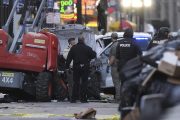
The Article 32 hearing in the case of army Major Nidal Hasan, the man accused of killing 13 people at a readiness center on Ft. Hood, Texas, commenced on October 13 as a judge overruled a request by Hasan’s defense team for a continuance.
On Tuesday, the hearing in the case was temporarily delayed as Colonel James L. Pohl, the presiding judge over the matter, adjourned the hearing at midday to allow the military psychiatrists examining Hasan to prepare the appropriate documents supporting their request for another continuance in the matter.
As with an earlier preliminary hearing, Hasan’s military lawyers moved for a delay in the start of the probable cause hearing so that they might have time to thoroughly process the information contained in “paperwork” they asserted was only recently provided to them by opposing counsel. This time, the lawyers for the former army psychiatrist asked the judge to set November 8 as the new date for the hearing. Hasan’s legal team contended that their defense of their client would be hamstrung if they were not granted the extension necessary for them to prepare for the critical Article 32 hearing.
The Article 32 hearing is a requisite step in the investigatory process of court martial as established by the Uniform Code of Military Justice. The hearing is similar in purpose and procedure to a civilian grand jury proceeding where a judge receives the testimony of witnesses and counsel to aid his inquiry into the truth of the matter set forth in the charges. At the conclusion of the hearing, the presiding officer will make a recommendation as to the disposition that should be made of the case in the interest of justice and discipline.
In Hasan’s case, the judge will deliberate over 13 counts of premeditated murder and 32 counts of attempted murder, the worst such incident ever on a U.S. military facility.
The first two of over 100 witnesses who have been subpoenaed to appear at the hearing testified today. First up was Sergeant Alonzo Lunsford. Lunsford, who was shot five times during the massacre, testified that Hasan looked him in the eye before firing. “The laser [attached to the barrel of the weapon] comes across my line of sight. I closed my eyes. He discharged his weapon,” the sergeant testified. Lunsford, who lost most of the sight in his left eye as a result of the gunshot wounds he suffered that day, also claimed that he saw Hasan remove weapons from his military uniform and that he heard him shout “Allahu Akbar.”
Michele Harper was the next witness to take the stand at the hearing to determine whether probable cause exists to have a full hearing on the merits of the case against Hasan. Harper, a medical technician, testified that she hid under a desk, watching Hasan slowly walk around the processing center opening fire on fellow soldiers. One of those soldiers was standing in front of Harper as he was shot three times.
It was Harper who called 911; a recording of that frantic call was played today in the courtroom. Harper reportedly cried during the playback. On the recording, sounds of gunfire, moaning, and cries for help can be heard over the voices of Harper and the dispatcher who tried to assure the young medic that help was on the way.
The testimony of witnesses will continue tomorrow and is expected to last three weeks.
As a result of being shot by the police, Hasan is paralyzed from the chest down and is confined to a wheelchair. As has been the case at earlier hearings where his presence was required, Hasan was wheeled into the courtroom and spoke very little as he sat with his legs bound with straps. Hasan was dressed in the uniform of a United States Army officer. Remarkably, as reported previously in The New American, Hasan is still authorized to wear that uniform and receive pay from the army.
As the witnesses related their testimony of the events of November 5, 2009, and as the tape of the 911 emergency call center was played, Hasan sat motionless at the end of the defense table.
As has been covered in The New American, while completing his residency at Walter Reed Army Medical Center, Major Nidal Hasan told an audience of fellow physicians that the Army should excuse Muslim soldiers from serving in combat zones where they would be fighting others of their faith. If Muslims in the U.S. Armed Forces were not thus afforded conscientious objector status, then there could be “adverse effects,” Hasan warned.?These astonishing remarks are even more incredible considering the inappropriateness of the time, place, and manner of their delivery. In the summer of 2007, Hasan and his fellow residents were assigned by their superiors at Walter Reed to prepare a presentation on any topic of medical relevance. They were then to present their work to a group of senior psychiatrists as part of their final student evaluation.
As Major Hasan stepped to the podium and began his address to the 30 or so medical professionals in attendance, instead of confining himself to the assigned topic, for over an hour he showed 50 slides and lectured on suicide bombers, general principles of Islam, and the potential harm that the Army could expect from Muslim soldiers torn by conflicting loyalties to God and country. “It’s getting harder and harder for Muslims in the service to morally justify being in a military that seems constantly engaged against fellow Muslims,” Hasan told the undoubtedly perplexed crowd.? Eerily, Hasan’s presentation, which he entitled “The Koranic World View as It Relates to Muslims in the U.S. Military,” ended with a final slide that read: “We love death more then [sic] you love life!”
Attorneys with the judge advocate general’s office prosecuting Hasan have yet to indicate whether they will seek the death penalty for Hasan should the case proceed to trial.
Photo: Thomas Rheinlander makes a statement during a break in the Article 32 hearing for Maj. Nidal Malik Hasan, Oct. 12, 2010 in Fort Hood, Texas: AP Images



